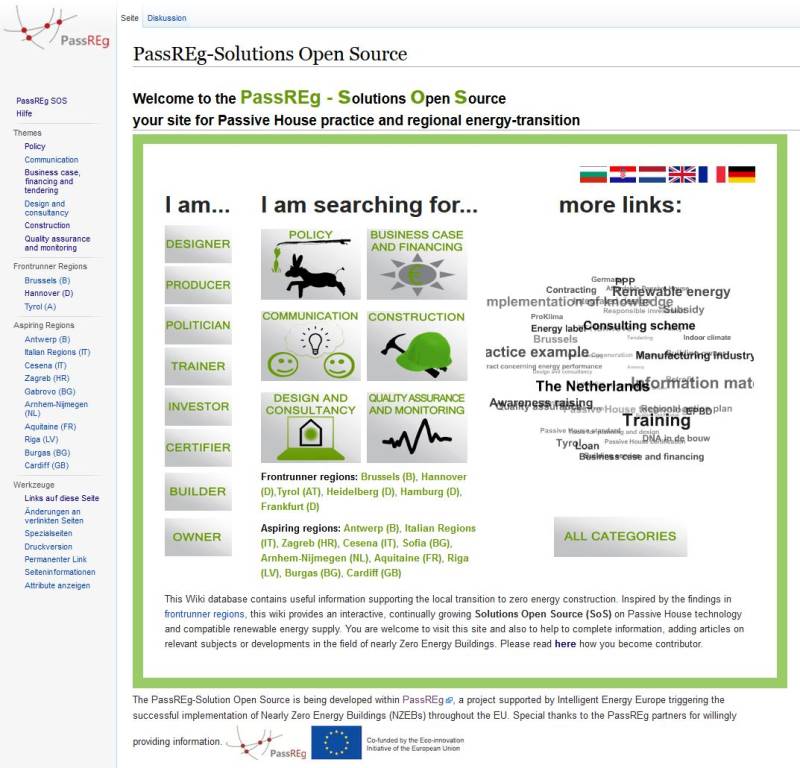Table of Contents
PassREg Solutions Open Source
A European database for regional Passive House development with renewable energy.
“There is no need to reinvent the wheel – the sharing of regional Passive House solutions is beneficial for everyone”. This is the guiding principle of the PassREg Solutions Open Source database. The database for the regional implementation of Passive House with renewable energy is intended to facilitate the finding of solutions and overcoming of difficulties in reaching towards an energy revolution in the built environment both in new builds and in retrofits.
In many localities, investors, construction planners, policy makers and construction experts are trying to introduce Passive House technology and the use of renewable energy in their buildings. All too often, they encounter financial, technical, administrative and political hurdles in so doing. These problems must be addressed.
At the same time, as the Passive House Standard is implemented more and more often in various regions, many brilliant ideas and innovative solutions have already been found. For example, some frontrunner regions such as Brussels, Tyrol, and Hanover have gained valuable experience as standards based on Passive House have become the norm. To experts in other regions, this experience can make a difference.
A database that boosts regional Passive House development
When implementing Passive House technology on a broad scale, regional challenges are complex and require an integrated approach for introducing smart construction and energy concepts. PassREg SOS has information on the entire spectrum of developments in (almost) energy-neutral construction and retrofitting and provides solutions related to policy, training, communication, construction economics and financing, tendering-practice, designing and consulting, structural issues, quality assurance and monitoring.
This database serves as a source of inspiration and information and supports stakeholders in overcoming any problems faced while trying to broadly implement passive buildings supplied by renewable energy sources. PassREg-SOS is not just for Passive House designers and tradespeople but also for all other Passive House trailblazers, from private investors and engineering teachers to regional politicians.
The website is set up like Wikipedia and strives to be accessible to a broad audience.
The sections “Regulatory framework,” “Business cases and financing,” “Design and consultancy,” “Knowledge and communication,” “Construction,” and “Quality assurance and monitoring” feature reports from the 14 European partner organizations of the PassREg project, initially focusing on ideas that led to success and individual solutions in the three European model regions of Brussels, Hanover and Tyrol. Highlights include the BatEX program, a successful financial support program for pilot Passive House projects in Brussels; the Zero e-Park, a new climate-neutral neighborhood in Hannover; and klima:aktiv, Austria's climate protection initiative. The database also contains articles on exemplary projects from other European regions that are just getting started with their energy transitions.
A do it yourself Passive House database
PassREg SOS is a wiki-database intended to be accessible to a broad audience. This implies that articles can be added by anyone interested in sharing specific solutions and successful methods for the uptake of Passive House and renewable energies.
A search function makes it easy to find all articles related to a certain topic or term, and the articles are organized in a tree structure to give readers a clear overview of the site. Individual pages can also be accessed from searches made in search engines, just like Wikipedia. The database is mainly a platform for sharing interesting concepts in a European context and is therefore currently offered in English, but it can be translated into other languages as needed in order to be easily accessible for regional development.
The site's syntax is identical to that of Wikipedia, making it easy for even laypeople to use. We encourage users to upload their own articles and expand and edit existing articles. Like in Wikipedia, the articles on PassREg SOS are monitored and completed by the users themselves.
A brief note on the creation of the database
The PassREg SOS was initiated in 2013 as part of the EU project known as PassREg (www.passreg.eu) for Passive House regions with renewable energies, coordinated by the Passive House Institute.
Under this project, DNA in de bouw (NL) and 14 other European partners 1) gathered and analysed data related to practical solutions and innovations in various European regions. This first collection of information is now open for additions and improvements by online users.
We would now like to sincerely welcome you to discover PassREg SOS for yourself. Anyone who has something well-founded to say about the implementation of Passive House in conjunction with renewables is expressly welcome to write an article and otherwise contribute to creating an inspirational database that helps Passive House trailblazer throughout the continent feel part of a strong European movement.
Just head on over to the PassREg Solutions Open Source
|
The sole responsibility for the content of Passipedia lies with the authors. While certain marked articles have been created with the support of the European Union, they do not necessarily reflect the opinion of the European Union or the initiating PassREg partners and editors. Neither the EACI nor the European Commission are responsible for any use that may be made of the information contained therein. |



